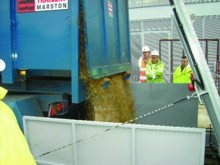Fuelling the debate on renewable fuels

Biomass heating using wood chips or wood pellets is very effective at reducing carbon-dioxide emissions — but poses storage problems.
Biomass and biofuel boilers were heavily promoted at H&V07 and ISH in Germany. So which is going to determine the future of green heating? Ian Bradley thinks it’s a two horse race — with biofuels nudging ahead.There have been many rivalries across the ages — Dr Who and the Daleks, VHS and Betamax, even Chelsea and Manchester United. But it is not often you get alternative technologies competing for pole position in the heating industry. However, the Government’s drive for renewable energy and the European Communities commitment for 20% renewable energy provision by 2020 have placed a huge pressure on manufacturers and fuel suppliers to release new and innovative products. So what options are there for commercial heating — and why the rivalry between the two technologies? My company has products available now for both biomass and biofuels and firmly believe it’s a case of horses for courses.
Biomass Biomass has been used very successfully for a number of years right across the world, but particularly in countries where there are large amounts of sustainable woodland and forests, like Canada and Scandinavia. Although biomass boilers do produce carbon dioxide in the combustion process, it is miniscule, even taking into account local transport and production of the timber and its management. By using biomass instead of fossil fuels, you can reduce net carbon-dioxide emissions by over 90% — which is good news for the environment. However, there are some drawbacks — not just moving scruffy tree-huggers like Swampy out of the way to cut down the timber. It’s more of a resourcing issue. Currently the supply of wood pellets and wood fuel is limited. There are some reports of pellets being shipped from as far away as Brazil, which can hardly be considered sustainable. Biomass certainly has limitations in city centres and built-up areas due to the logistics of delivery and storage. That said, for commercial applications in more rural areas, where storage space is not so limited, it can be an excellent, sustainable and renewable solution. Certainly when it is coupled with technology like solar water heating, it can have a tiny carbon footprint.
Biofue/ls The partner of biomass in this surge for renewables is biofuels. Biofuels are already a viable and sensible alternative in the industry, although they are under utilised and sometimes ignored. I am not talking about pure rapeseed or waste oil, which would be too heavy and cause major shifts in burner technology. What I think we should see more of is blended biofuels –—traditional heating oil blended with liquid fuels produced from renewable resources such as rapeseed oil, palm oil, or used cooking (vegetable) oil. They are available in a number of different proportions — anything from 95% standard heating oil blended with 5% renewable to 90% renewable blended with 10% standard oil. The fuels are already able to be used in standard heating equipment at the 20% biofuel ratio — instantly meeting the 20% renewables commitment. The movement for these fuels is growing. Eurofuel, a pan-European organisation of fuel producers, heating manufacturers, installers and distributors, is already lobbying the European Parliament to ensure these fuels are not ignored and are used in the fight against greenhouse gases and climate change. The good news for both installers and specifiers is that with these kinds of biofuels, you can achieve the 20% use of renewable fuels with little or no change to your boilers and burners. With the distribution infrastructure being developed, they present a truly viable alternative to biomass. You can continue to use tried-and-tested technology — which is cheaper to install, cheaper to service and cheaper to run. And you can do your bit for the environment without having to engage in a wholesale revamp of your existing heating system. So, all in all, things are looking bright for both these renewable technologies — whether you want to install a biomass boiler or power your existing heating system with biofuels. It is not so much the lesser of two evils, more the greater of two goods. Ian Bradley is managing director of MHS Boilers.
Related links:
Related articles:


